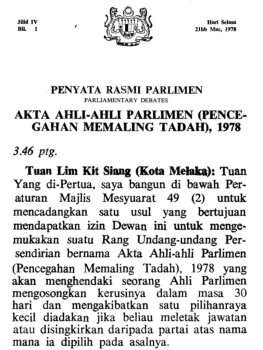Six years ago, the Cabinet under Tun Dr. Mahathir took a hasty and ill-considered decision to rush headlong to implement the PPSMI (Pengajaran dan Pembelajaran Sains dan Matematik dalam bahasa Inggeris/Teaching and Learning of Science and Mathematics in English) from Standard One for all primary schools.
It was carried out without proper or adequate preparation, making five million Malaysian schoolchildren the guinea pigs of BN politicians in the past six years.
Recently, the Cabinet under Datuk Seri Najib Razak – in trying to undo the failure and disaster of the ill-considered Cabinet decision six years ago which incurred RM4 billion of public funds – once again committed the folly of yet another ill-considered decision that will victimize millions of Malaysian students for a second time in their education.
DAP Parliamentary Leader Lim Kit Siang expressed shock and disbelief that Cabinet Ministers and Education Ministry officials could be so irresponsible and unprofessional as to turn million of students into guinea pigs for their half-baked educational experiments, not once but twice in a decade.
“Students in Form 1 this year will continue to be taught Maths and Science in English until Form 3 in 2011, having spent the past six years in primary school with English as the medium of instruction for these two subjects under PPSMI.
However, when they go to Form 4 in 2012, the medium of instruction for these two subjects will be in Bahasa Malaysia, and this will continue into Form 5.
“In 2013, when they sit for SPM, they will have to cope with Mathematics and Science in Bahasa Malaysia although they were taught the two subjects in English for the first nine of their 11 years of primary and secondary education.
“It is not only this batch of students who will be victimized but an entire generation of school-going children from 2003 to 2013 and beyond! Such thoughtless and careless attitude is a most irresponsible and crazy way to run the education system of a country,” Lim lamented.
How could BN component parties have permitted such a far-reaching decision to be taken in such an irresponsible manner?
MCA President Datuk Seri Ong Tee Keat had said MCA is of the view that the use of English as medium of instruction for Forms 4 or 5 should be maintained even after 2012.
The question is, why then did the four MCA Ministers, Gerakan and MIC Ministers fail to ensure that Cabinet made the right decision?
This is another example of the failure of MCA, Gerakan and MIC Ministers to speak up loud and clear and ensure that the Cabinet does only what is right and good for the people and nation and not just to serve certain political objectives.
Former Prime Minister, Tun Abdullah Badawi and the Deputy Education Minister Dr. Mohd Puad Zarkashi have openly admitted that the RM4 billion PPMSI experiment in the past six years had been “a failure”.
If so, there is absolutely no justification for the Cabinet to defer its abolition until 2012 instead of immediate implementation next year?
The Cabinet decision appears more politically motivated than based on the educational interests of students and the need to create the conditions for an internationally competitive Malaysia which is capable of fully exploiting the human and natural resources of the country to become a high-income nation.
“One size fits all” slution untenable
The Education Ministry has admitted that introducing PPSMI from Standard One is a RM4bil failure, confirming the DAP’s stand since 2002 that PPSMI should not be introduced at Standard One as a “One Size Fits All” solution for all schools, but only at the higher standards.
The DAP believes in the flexibility of the system in dealing with the problems of the different-medium primary schools with the objectives of raising the standards of proficiency in English, Maths and Science while maintaining Bahasa Malaysia as a compulsory subject.
National, Chinese and Tamil primary schools should be given room to strengthen the proficiency of their students in the three subjects or all of them where they are weak – for instance allowing Chinese primary school students who are strong in Maths and Science to focus on English proficiency while national and Tamil primary school students have special programmes to uplift their proficiency in these three subjects.
Parents should be allowed to pick the type of education they want for their children – including having classes or schools using English as medium for instruction for Maths and Science.
Six years ago, Mahathir broached the idea of the possibility of the government re-introduction of the English-medium school system to arrest the decline of the standard of English. This proposal should be seriously revisited by the Cabinet, Parliament and the Malaysian public.
The DAP demands that a mechanism be set up, whether at Cabinet or parliamentary level, to make proposals as to how the educational system could become more flexible, liberal and innovative to allow parents the choice to decide on the medium of instruction for their children in Maths and Science, both primary and secondary, in line with the national aspirations to be internationally competitive to become a high-income nation.
* The DAP believes the following steps will contribute towards creating the conditions needed to make Malaysia more internationally competitive:
- Endorsing the call of Parents Action Group for Education (PAGE) that schools should be given the option to teach Science and Mathematics in Bahasa Malaysia or English or one’s mother tongue;
- Reintroduce the use of English as medium of instruction for Mathematics and Science in secondary schools. The Cabinet must make English a compulsory pass subject for SPM, STPM and matriculation courses.
- For the first five years, English should be made a compulsory pass subject. Students who fail English and therefore fail the whole SPM examination should be required to repeat the single subject of English to entitle them to a SPM pass, unlike the present ruling requiring the student to repeat the entire SPM examination, including subjects they had passed;
- A flexible education approach that takes into account the urban-rural gap as well as the weaknesses of students, particularly in rural areas in proficiency in English, Mathematics and Science; and
- Adhere to the important principle that advanced students should not be held back because of students who lag behind academically.



